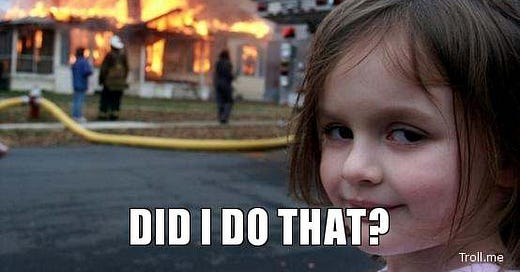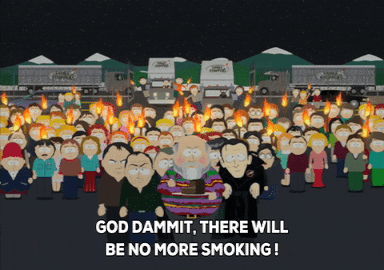Hi👋 Tapan here.
Monthly Mulling is a bi-monthly newsletter curating the best ideas from the web to your inbox for free. High signal. Low noise. Join now👇🏽
Note: If my emails end up in the ‘promotions’ tab, please move them to the inbox so you don’t miss out.
Happy Sunday y’all!
I joined the 30s club on Friday and celebrated my birthday with a few close friends in London.
A simple takeaway from the experiences of the past decade — Improve 1% daily, live without expecting, and don’t be a d*ck.
Currently,
📖 What I am reading: The Crowd: A Study of the Popular Mind by Gustave Le Bon (continue reading for some lessons from the book)
📺 What I am watching: LOTR: The Rings of Power
Onwards 🚀
🧠 Take A Fence
There’s a saying among programmers, don’t change code that you don’t understand.
Why?
There’s a simple yet effective mental model to avoid this. It not only applies to programmers but to all professionals.
🧠The Chesterton’s Fence: The principle that reforms should not be made until the reasoning behind the existing state of affairs is understood.
Put simply, don't take a fence down unless you know why it was put up.

It’s a reminder that we don’t always know better than those who made decisions before us, and we can’t see all the nuances of a situation until we’re intimate with it.
💡Unless we know why someone made a decision, we can’t safely change it or conclude that they were wrong.
The first step before modifying an aspect of a system is to understand it. Observe it in full. Note how it interconnects with other aspects, including ones that might not be linked to you personally. Learn how it works, and then propose your change.
- Shane Parrish, Chesterton’s Fence
🐒 Three’s A Crowd
I am halfway through reading Crowd: A Study of the Popular Mind by Gustave Le Bon which was first published in 1895 and has greatly influenced Freud, Hitler, Mussolini, and Roosevelt (among many others). Pretty sure, General Aladeen must have read this book.
It’s a study of the psychology of crowds and how they behave 🧠
I want to share three traits of a crowd.
💪🏽 Invincibility: The crowd being anonymous creates a delusion of invincibility. A person can make irresponsible decisions while being part of the crowd that had he/she been alone wouldn’t make.
😶🌫️ Isolation: Because of that anonymity and feeling of invincibility, individuals feel isolated. They are still part of a crowd but will behave as if they’re alone.
Whoever be the individuals that compose it, however like or unlike be their mode of life, their occupations, their character, or their intelligence, the fact that they have been transformed into a crowd puts them in possession of a sort of collective mind which makes them feel, think, and act in a manner quite different from that in which each individual of them would feel, think, and act were he in a state of isolation.
And because of this collective mindset, a person who is part of a crowd cannot be expected to make rational decisions.
This very fact that crowds possess in common ordinary qualities explains why they can never accomplish acts demanding a high degree of intelligence.
Crowds are only capable of thinking in images and are only to be impressed by images. It is only images that terrify or attract them and become motives for action.
😷 Contagion: In a crowd, every sentiment and act is contagious, and contagious to such a degree that an individual readily sacrifices his personal interest to the collective interest.
Emotions, especially fear and hate, are contagious in crowds because people experience a decline in personal responsibility; they will do things as a collectivity that they would never do when acting alone.
Le Bon believed that a crowd’s mind cannot differentiate the subjective from the objective, and is only capable of thinking in vivid images and simple yet extreme ideas.
💭 What does it mean?
I have seen this a lot in political speeches where an image is created by politicians that people of one country, religion, sect, caste (and so on) are in danger and need to be protected. The protection can occur only through action from the crowd.
For a crowd, these vivid images and extreme ideas act as gasoline. Individuals in the crowd sense a feeling of anonymity and invincibility; they want to take action. The hate and fear spread like a contagion feeding on itself leading to irrational decisions.
A person may be a cultivated individual, when alone; in a crowd, they are barbaric — that is, a creature acting by instinct.
✍🏽 Write The Wrong
If you want to start something but feel like somebody has already done it before, here’s a post from r/writing.
If you have an idea but think “someone has already written that” just remember there are 1,010 published biographies of Winston Churchill.
- Morgan Housel
🎙COLD BREW MONEY
Can I ask you to share the podcast with one friend/family this weekend?
Do you think any of your friends will like Monthly Mulling like you? Please share!😇
Thanks for reading. If you have feedback, you can reach out to me on Instagram, Twitter, LinkedIn, or just reply to this email!











